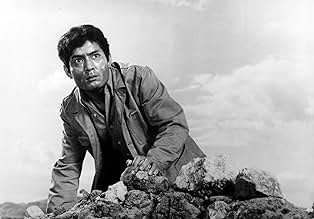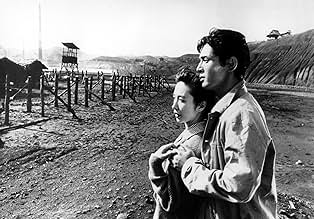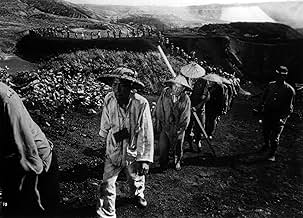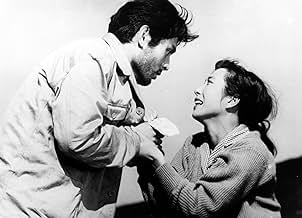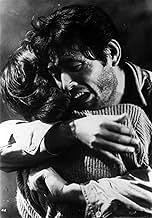IMDb रेटिंग
8.5/10
10 हज़ार
आपकी रेटिंग
अपनी भाषा में प्लॉट जोड़ेंA Japanese pacifist, unable to face the dire consequences of conscientious objection, is transformed by his attempts to compromise with the demands of war-time Japan.A Japanese pacifist, unable to face the dire consequences of conscientious objection, is transformed by his attempts to compromise with the demands of war-time Japan.A Japanese pacifist, unable to face the dire consequences of conscientious objection, is transformed by his attempts to compromise with the demands of war-time Japan.
- निर्देशक
- लेखक
- स्टार
- पुरस्कार
- 5 जीत और कुल 1 नामांकन
Kôji Nanbara
- Kô
- (as Shinji Nanbara)
फ़ीचर्ड समीक्षाएं
Kobayashi's "The Human Condition" is one of a handful of great anti-war movies. While Japanese film has confronted its own crimes of war more than other cinema, I am only familiar with one other Japanese movie which deals directly with the war & the plight of conscientious objectors: Kurosawa's "No Regrets for Our Youth". Many films deal with the futility of war: "Seven Samurai" & "Yojimbo" come immediately to mind. But "Human Condition" takes on the enormity of war, & the means by which everyone becomes complicit in its total corruption. The hero, though a Conscientious Objector, becomes a colonial occupier, an exploiter of slave labor, an employer of a madam who runs a camp of women & girls impressed into prostitution, & generally runs the gamut of crimes against humanity while trying to maintain his virtue & love's beauty.
Parts II & III also explore the brutality of the army toward its own soldiers, & the complete desecration of the ideals of the Russian Revolution & the cruelty of ordinary Chinese villagers.
"The Human Condition" should be ranked with "Grand Illusion", though what could be as lyrical as the Renoir film? If only this were require viewing in all military academies. If only it were required viewing for all lawmakers & the executive. Is that asking too much?
Parts II & III also explore the brutality of the army toward its own soldiers, & the complete desecration of the ideals of the Russian Revolution & the cruelty of ordinary Chinese villagers.
"The Human Condition" should be ranked with "Grand Illusion", though what could be as lyrical as the Renoir film? If only this were require viewing in all military academies. If only it were required viewing for all lawmakers & the executive. Is that asking too much?
An interesting film that portrays the struggles of an idealistic young Japanese man who is challenged to employ his idealism in the service of the Japanese war effort in WW II. A key aspect of this struggle is the protagonist's struggle within himself. Kaji, the young man, seeks to humanize the brutal conditions at a mining operation in Manchuria. Further complicating matters is the profound sense of national prejudice that shapes the relationships between the various characters. To the workers & Chinese prisoners, regardless of his professed ideals, Kaji is Japanese and therefore an oppressor. Although Kaji tries to win their trust, his own frustration enables him to strike a young Chinese helper, reinforcing the image of the brutal Japanese. This weakness is a key underlying theme. Even late in the film, when he takes a very brave stand against some executions, his effort is a bit late and his stand is successful only when the Chinese prisoners take up the protest. He struggles because her fears he cannot live up to the ideals he expresses.
Kaji is also confronted with the another irony. Although he opposes the war, he has chosen a route of avoidance rather than resistance. This is emphasized early in the film during an evening with a friend who is about to be inducted. His friend comments that, although they opposed the war, neither of them was brave enough to face the penalty for resistance of life imprisonment. Shortly thereafter, he takes the mine job to get a military exemption. Yet, if he is successful, the production improvements in the mine only fuel the Japanese war machine.
A valuable film because it explores areas of the pacific war that are not well know in the west. Also an interesting observation in the danger of half-measures when taking a moral stance. Kaji is ultimately confronted with the fact that you cannot avoid the war, only oppose it or aid it. I look forward to viewing the next film.
Kaji is also confronted with the another irony. Although he opposes the war, he has chosen a route of avoidance rather than resistance. This is emphasized early in the film during an evening with a friend who is about to be inducted. His friend comments that, although they opposed the war, neither of them was brave enough to face the penalty for resistance of life imprisonment. Shortly thereafter, he takes the mine job to get a military exemption. Yet, if he is successful, the production improvements in the mine only fuel the Japanese war machine.
A valuable film because it explores areas of the pacific war that are not well know in the west. Also an interesting observation in the danger of half-measures when taking a moral stance. Kaji is ultimately confronted with the fact that you cannot avoid the war, only oppose it or aid it. I look forward to viewing the next film.
In the World War II, the pacifist and humanist Japanese Kaji (Tatsuya Nakadai) accepts to travel with his wife Michiko (Michiyo Aratama) to the tiny Manchurian village Loh Hu Liong to work as supervisor in an iron ore mine to avoid to be summoned to the military service. Kaji, who defends communists principles, works with Okishima (Sô Yamamura) and he implements a better treatment to the laborers and improves the mine production.
When the feared Kempetai (The "Military Police Corps", the military police arm of the Imperial Japanese Army from 1881 to 1945) brings six hundred Chinese POWs to the mine, Kaji negotiates with their leaders expecting them to control their comrades. However the methods of Kaji upset the corrupt system in the site, and the foreman Furuya (Kôji Mitsui) plots a scheme to use the naive Chen (Akira Ishihama) to turn off the electrical power of the barbwire fences to allow the prisoners to escape.
When seven prisoners are falsely accused of an attempt of fleeing, a cruel Kempetai sergeant uses his sword to behead the prisoners. When Kaji protests, the POWs react sparing the lives of four prisoners but Kaji is arrested and tortured. When he is released, he is summoned to join the army and accused of being Red.
"The Human Condition – Parts I & II" is the anti-war masterpiece by Masaki Kobayashi. The story is impressively realistic and magnificently shot with top-notch camera work, giving the sensation of a documentary. I bought the box released by the Criterion approximately one year ago, and only today I have just watched the two first DVD with about 400 minutes running time. Tomorrow I will finish watching this masterpiece. My vote is ten.
Title (Brazil): Not Available
When the feared Kempetai (The "Military Police Corps", the military police arm of the Imperial Japanese Army from 1881 to 1945) brings six hundred Chinese POWs to the mine, Kaji negotiates with their leaders expecting them to control their comrades. However the methods of Kaji upset the corrupt system in the site, and the foreman Furuya (Kôji Mitsui) plots a scheme to use the naive Chen (Akira Ishihama) to turn off the electrical power of the barbwire fences to allow the prisoners to escape.
When seven prisoners are falsely accused of an attempt of fleeing, a cruel Kempetai sergeant uses his sword to behead the prisoners. When Kaji protests, the POWs react sparing the lives of four prisoners but Kaji is arrested and tortured. When he is released, he is summoned to join the army and accused of being Red.
"The Human Condition – Parts I & II" is the anti-war masterpiece by Masaki Kobayashi. The story is impressively realistic and magnificently shot with top-notch camera work, giving the sensation of a documentary. I bought the box released by the Criterion approximately one year ago, and only today I have just watched the two first DVD with about 400 minutes running time. Tomorrow I will finish watching this masterpiece. My vote is ten.
Title (Brazil): Not Available
Masaki Kobayashi's dream project was the Human Condition adaptation, and he pulled it off as a brilliantly told and filmed epic that tells of a man trying to cling to his humanity in inhuman circumstances. All three films have wonders in various supporting performances and set-pieces that astound with their moments of poetic realism, and the sum of it all makes Lord of the Rings look like kid's stuff. In the case of the first feature on the trilogy, No Greater Love, we're introduced to and see the young, idealistic and essentially good-hearted Kaji (Tatsuya Nakadai) as he gets a job as a labor supervisor at a POW camp in Manchuria following an impressive paper presentation. He wants to do his best, but the 'powers-that-be', which include the stalwart boss and particularly the fascistic Kempeitai (army personnel on site), keep things always on edge with tension, and as new Chinese POW's roll in and he finds himself torn: how to keep production up of the ore while also not becoming a monster just like the other "Japanese devils" to the POW's.
While the story has an immediate appeal (or rather connection-to) the Japanese public as a piece of modern history- the occupation/decimation of Manchuria and its people- none of its dramatic or emotional power is lost on me. Kobayashi is personally tied to the material very much (he himself fought in the war and immediately bought the rights to the 6-volume series when first released), but he doesn't ever get in the way of the story. Matter of fact, he's a truly amazing storyteller first and foremost; dazzlingly he interweaves the conflicts of the prisoners (i.e. Chen, the prostitutes, Kao) with Kaji's first big hurdle of conscience at the labor camp as he sees prisoners treated in horrible conditions, beaten, abused, and eventually brought to senseless deaths thanks to Furyua and his ilk, and finds himself brought to an ultimate question: can he be a human being, as opposed to another mindless monster?
Kobayashi creates scenes and moments that are in the grand and epic tradition of movies, sometimes in beautiful effect and other times showing for the sake of the horrors of wartime (for example, there will never be as harrowing an exodus from a half-dozen cattle cars as seen when the Chinese POW's exit from there to the food sacks), and is able with his wonderful DP to make intimately acted scenes in the midst of wide scapes like the outside ore mines and the cramped living quarters or caves. And damn it all if we don't get one of the great scenes in the history of movies, which is when the six "escapees" are put to execution with the prisoners, and horrified Kaji, watching in stark, gruesome detail. Everything about that one scene is just about perfect.
But as the anchor of the piece (and unlike the other two films, he's not even in every scene of this part), Tatsuya Nakadai delivers on his breakthrough performance. Kobayashi needed a bridge between pre and post-war Japan, and Nakadai is that kind of presence. But aside from being an appealing star- the kind you don't want to avert your eyes from- he's mind-blowingly talented be it in subtle bits of business or when he has to go to town in explosive emotional scenes (or, also, just a twitch under his eye in a super-tense exchange). This goes without saying other actors right alongside him- Aratama, Yamamura, Manbara- are perfectly cast as supervisor, prisoner, prostitute, wife alike to Kaji. And yet, for all the praise worth giving to the film, one that gets even better in its second half than its first, this is only the first part!
While the story has an immediate appeal (or rather connection-to) the Japanese public as a piece of modern history- the occupation/decimation of Manchuria and its people- none of its dramatic or emotional power is lost on me. Kobayashi is personally tied to the material very much (he himself fought in the war and immediately bought the rights to the 6-volume series when first released), but he doesn't ever get in the way of the story. Matter of fact, he's a truly amazing storyteller first and foremost; dazzlingly he interweaves the conflicts of the prisoners (i.e. Chen, the prostitutes, Kao) with Kaji's first big hurdle of conscience at the labor camp as he sees prisoners treated in horrible conditions, beaten, abused, and eventually brought to senseless deaths thanks to Furyua and his ilk, and finds himself brought to an ultimate question: can he be a human being, as opposed to another mindless monster?
Kobayashi creates scenes and moments that are in the grand and epic tradition of movies, sometimes in beautiful effect and other times showing for the sake of the horrors of wartime (for example, there will never be as harrowing an exodus from a half-dozen cattle cars as seen when the Chinese POW's exit from there to the food sacks), and is able with his wonderful DP to make intimately acted scenes in the midst of wide scapes like the outside ore mines and the cramped living quarters or caves. And damn it all if we don't get one of the great scenes in the history of movies, which is when the six "escapees" are put to execution with the prisoners, and horrified Kaji, watching in stark, gruesome detail. Everything about that one scene is just about perfect.
But as the anchor of the piece (and unlike the other two films, he's not even in every scene of this part), Tatsuya Nakadai delivers on his breakthrough performance. Kobayashi needed a bridge between pre and post-war Japan, and Nakadai is that kind of presence. But aside from being an appealing star- the kind you don't want to avert your eyes from- he's mind-blowingly talented be it in subtle bits of business or when he has to go to town in explosive emotional scenes (or, also, just a twitch under his eye in a super-tense exchange). This goes without saying other actors right alongside him- Aratama, Yamamura, Manbara- are perfectly cast as supervisor, prisoner, prostitute, wife alike to Kaji. And yet, for all the praise worth giving to the film, one that gets even better in its second half than its first, this is only the first part!
10crubpni
Hello, my name's Jacob. I'm a 21 year old guy, from Israel, forced to join the army at the age of 18 as nearly all people of my country have to, forced to waste 3 years of my life doing things I'd never want to do if only I was allowed to choose. I'm not a great movie buff. I'm a simple person, and I'd rather play a video game to kill time, but I do like action and war films which is how I got to see "The human condition" on some list here on IMDb. Sounded interesting, and so I decided to watch the 3 films. So this is a review about all 3...
The films accurately demonstrates, maybe to the extreme, what it is to be a peace-loving, good human being, in a place where fascism and cruelty reigns supreme. Some people may say that Kaji's character is too unbelievable. Too saint-like, to the point where it becomes frustrating. I say it's not true- It's a movie, not real life. Kaji's behaviour might not be realistic, he faces humanity's worst traits with his own altruist ideals of pacifism and equality, as if he's some sort of WW2 superhero. Saying one cannot identify with him is wrong, however, in my humble opinion, because even if maybe you wouldn't act the way he did when put in the same situations, you can appreciate the way he handled himself, you can admire him and aspire to be like him. He isn't a saint though, he makes mistakes, born out of the cruelty and misery that surrounds him, betraying at times the "code" that he is supposed to protect and follow, but even then, you know that ultimately deep down he's the same person, no matter how things go.
Seeing many many irrational things in my military service, I can relate to Kaji in many ways. Seeing people who dedicate their lives to controlling others for the sake of getting promoted, to get appreciated by their superiors who actually appreciate them about as little as they appreciate their own soldiers. People who care for their own interests far more than they care for the interests of those they are in charge of, crushing their wants and needs and deeming them unimportant in the blink of an eye, while their own interests take much higher priority... People who enforce and follow strict rules that are unbending and unreasonable, with such a passion, that it makes you think any reasonable man would dismiss those people as insane, yet still, those are the people who are in charge, because they are the ones who stay in the army and dedicate their lives to it and to it's incredible stupidity, while the real reasonable people go on to dedicate their lives to do something that might actually be beneficial to humanity. This has now officially become somewhat of a rant of how terrible military life and discipline is, maybe more so than it is a review of this series of movies. But why I am saying all of this? because these observations of mine- they are accurately depicted in this movie. If only these real life people that I know were just trying to be a bit better, a bit more human, more like Kaji, maybe my impression of what the army is like wouldn't have been so gloomy as they are now. Kaji, in the films, tries-everywhere he goes-to set things right for those around him, he goes through so many terrible things, scenes that are so... Vile, and so distorted from what you think of human nature as it is in our usually comfortable modern life, and with sheer willpower, he triumphs, even if his triumph is just in him, staying alive while everything else is gone. But ultimately, does it do him any good? If he were to die in the first movie, would that have been better? saved him the suffering of everything he went through later? Well, that is for you to decide. What these films have taught me, is that no matter how it ends, it is important for a person to do what he sees as the right thing to do, and to never lose sight of what the right thing to do is... I'd define a good movie as one that makes you think at the end. It doesn't have to be a cool plot twist at the end that makes you think, it just has to be a movie complex enough but also engaging enough to make you think at the end, because you didn't have time to figure out everything you wanted while you were watching it. At the end of the third movie however, I didn't have to think of anything. I had already absorbed everything. All I wanted was to sleep, and just couldn't. My mind was empty, and I could feel only one thing- awe. And that is why I rate "The human condition" 10/10.
I'm terribly sorry if what you just read sounded like a bunch of drivel. Maybe this review is not for you, and maybe the movie is not for you. But regardless, I thank you for reading it to the very end. Have a nice day.
The films accurately demonstrates, maybe to the extreme, what it is to be a peace-loving, good human being, in a place where fascism and cruelty reigns supreme. Some people may say that Kaji's character is too unbelievable. Too saint-like, to the point where it becomes frustrating. I say it's not true- It's a movie, not real life. Kaji's behaviour might not be realistic, he faces humanity's worst traits with his own altruist ideals of pacifism and equality, as if he's some sort of WW2 superhero. Saying one cannot identify with him is wrong, however, in my humble opinion, because even if maybe you wouldn't act the way he did when put in the same situations, you can appreciate the way he handled himself, you can admire him and aspire to be like him. He isn't a saint though, he makes mistakes, born out of the cruelty and misery that surrounds him, betraying at times the "code" that he is supposed to protect and follow, but even then, you know that ultimately deep down he's the same person, no matter how things go.
Seeing many many irrational things in my military service, I can relate to Kaji in many ways. Seeing people who dedicate their lives to controlling others for the sake of getting promoted, to get appreciated by their superiors who actually appreciate them about as little as they appreciate their own soldiers. People who care for their own interests far more than they care for the interests of those they are in charge of, crushing their wants and needs and deeming them unimportant in the blink of an eye, while their own interests take much higher priority... People who enforce and follow strict rules that are unbending and unreasonable, with such a passion, that it makes you think any reasonable man would dismiss those people as insane, yet still, those are the people who are in charge, because they are the ones who stay in the army and dedicate their lives to it and to it's incredible stupidity, while the real reasonable people go on to dedicate their lives to do something that might actually be beneficial to humanity. This has now officially become somewhat of a rant of how terrible military life and discipline is, maybe more so than it is a review of this series of movies. But why I am saying all of this? because these observations of mine- they are accurately depicted in this movie. If only these real life people that I know were just trying to be a bit better, a bit more human, more like Kaji, maybe my impression of what the army is like wouldn't have been so gloomy as they are now. Kaji, in the films, tries-everywhere he goes-to set things right for those around him, he goes through so many terrible things, scenes that are so... Vile, and so distorted from what you think of human nature as it is in our usually comfortable modern life, and with sheer willpower, he triumphs, even if his triumph is just in him, staying alive while everything else is gone. But ultimately, does it do him any good? If he were to die in the first movie, would that have been better? saved him the suffering of everything he went through later? Well, that is for you to decide. What these films have taught me, is that no matter how it ends, it is important for a person to do what he sees as the right thing to do, and to never lose sight of what the right thing to do is... I'd define a good movie as one that makes you think at the end. It doesn't have to be a cool plot twist at the end that makes you think, it just has to be a movie complex enough but also engaging enough to make you think at the end, because you didn't have time to figure out everything you wanted while you were watching it. At the end of the third movie however, I didn't have to think of anything. I had already absorbed everything. All I wanted was to sleep, and just couldn't. My mind was empty, and I could feel only one thing- awe. And that is why I rate "The human condition" 10/10.
I'm terribly sorry if what you just read sounded like a bunch of drivel. Maybe this review is not for you, and maybe the movie is not for you. But regardless, I thank you for reading it to the very end. Have a nice day.
क्या आपको पता है
- ट्रिवियाAccording to Tatsuya Nakadai, a marathon screening of the entire nine-and-a-half-hour "Human Condition" trilogy is held once a year in Japan, and he has once or twice attended these screenings, which are always sold out.
- गूफ़At one point a Japanese guard begins to whip Kao, yet the motions he makes are just a flailing of his arms, visibly missing the actor. Kao retaliates by throwing a rock at the guard, but the rock never strikes the guard. However, the actor playing the guard overreacts as if he has been struck.
- भाव
Kuroki Shochô: You know, Kaji, theory may be correct and yet not always apply to reality.
Kaji: Then either the theory is wrong or it was incorrectly applied.
- कनेक्शनFollowed by Ningen no jôken (1959)
टॉप पसंद
रेटिंग देने के लिए साइन-इन करें और वैयक्तिकृत सुझावों के लिए वॉचलिस्ट करें
- How long is The Human Condition I: No Greater Love?Alexa द्वारा संचालित
विवरण
- रिलीज़ की तारीख़
- कंट्री ऑफ़ ओरिजिन
- भाषाएं
- इस रूप में भी जाना जाता है
- The Human Condition I: No Greater Love
- फ़िल्माने की जगहें
- होकाईडो, जापान(Exterior scenes of the Manchurian mine)
- उत्पादन कंपनियां
- IMDbPro पर और कंपनी क्रेडिट देखें
- चलने की अवधि
- 3 घं 28 मि(208 min)
- रंग
- ध्वनि मिश्रण
- पक्ष अनुपात
- 2.35 : 1
इस पेज में योगदान दें
किसी बदलाव का सुझाव दें या अनुपलब्ध कॉन्टेंट जोड़ें


